Blog del Instituto Cervantes en Utrecht
Todo sobre nuestras actividades y servicios
Cuentacuentos del Día de la madre
El domingo 14 de mayo celebramos el “Día de la madre” en Los Países Bajos, por eso en nuestro rincón infantil vamos a celebrarlo el miércoles 17 de mayo de 15:00 a 16:00 con cuentos, poesías, canciones y mucha diversión.
Como bien lo dice la poetisa chilena Gabriela Mistral en su poesía “Caricia”:
“Madre, madre, tú me besas,
pero yo te beso más,
y el enjambre de mis besos,
no te deja ni mirar…”
En este cuenta cuentos celebraremos a las madres y el amor de sus hijas/os, leeremos emotivas y entretenidas historias sobre los distintos tipos de mamás ¿reconoces a la tuya?
También aprenderemos una linda poesía y una canción para decirle a mamá, o las abuelas que también son mamás grandes.
¡Os esperamos!
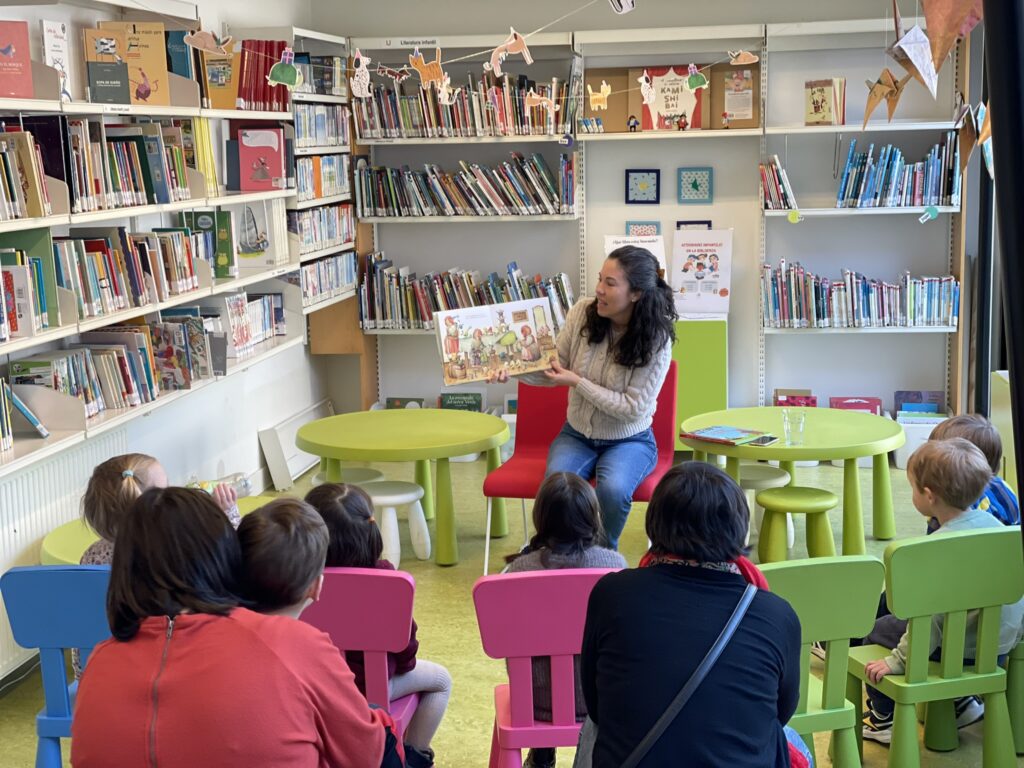
Kinderverhalen «Moederdag«
Op zondag 14 mei vieren we in Nederland «Moederdag», daarom vieren we het in onze kinderhoek op woensdag 17 mei van 15:00 tot 16:00 uur met verhalen, gedichten, liedjes en veel plezier.
Zoals de Chileense dichteres Gabriela Mistral zegt in haar gedicht «Carcia» («Streel»):
«Moeder, moeder, je kust me,
maar ik kus jou meer,
en de zwerm van mijn kussen,
laat je niet eens kijken…»
In deze verhalenverteller vieren we moeders en de liefde voor hun kinderen, we lezen ontroerende en vermakelijke verhalen over de verschillende soorten moeders. ¿Herken je die van jou?
Ook zullen we een mooi gedicht en een liedje leren om tegen mama, of oma’s die ook goede moeders zijn, te zeggen.
We kijken uit naar je komst!
El fútbol en España, más que una religión.
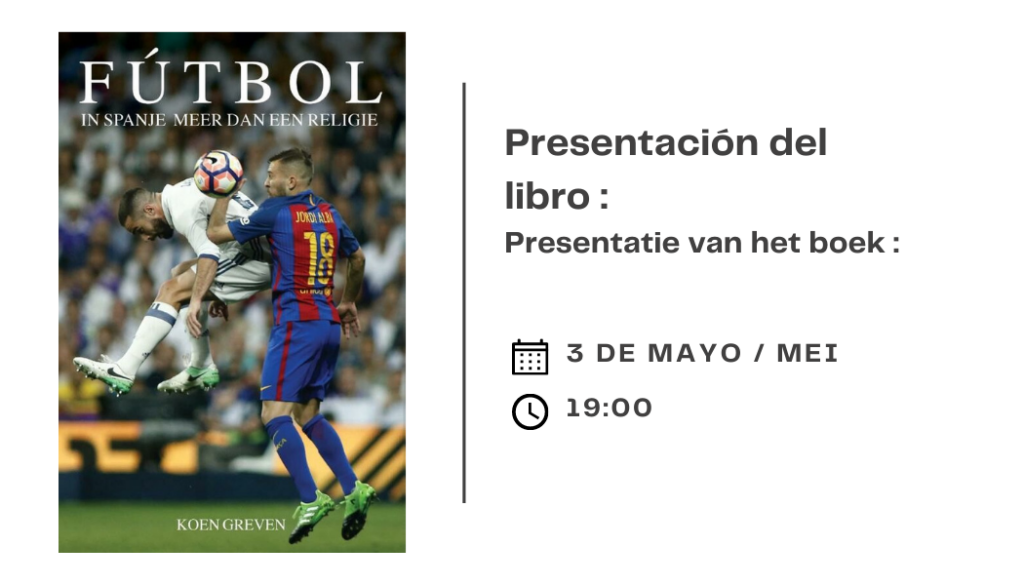
Con motivo de la publicación del ensayo Fútbol in Spanje meer dan een religie, del escritor y periodista holandés Koen Greven, el Instituto Cervantes de Utrecht organiza un coloquio sobre la trascendencia del fútbol en la sociedad española.
En el coloquio participarán el escritor y periodista Koen Greven, el periodista Miquel Ekkelenkamp Bulnes y el ex futbolista Juan Viedma Schenkhuizen.
Según el escritor Koen Greven, Fútbol in Spanje meer dan een religie es un libro para todos los amantes de España y del fútbol, que ofrece un personal retrato del país y de sus habitantes. En palabras de Koen Greven, «España es el país de la dicotomía y de la rivalidad y se extiende por igual a través de sus diecisiete diferentes regiones. En este mosaico, la pasión por el fútbol es uno de los pocos denominadores comunes. El deporte está en el ADN de madrileños, vascos, catalanes y andaluces y es el hilo conductor de este peculiar libro».
Koen Greven es redactor del periódico NRC desde 1995. De corresponsal parlamentario pasó en 2015 a ser corresponsal en España hasta 2022. Como socio del Atlético de Madrid, Greven vivió en un barrio con solo fanáticos del Real Madrid lo que le permitió conocer a los españoles hasta la médula a través del fútbol. Una pasión que los conecta, pero quizás aún más los diferencia. Como dijo Johan Cruiff «En España, los 22 jugadores se santiguan antes de entrar al campo, así que, si funciona, siempre será un empate.»
Miquel Ekkelenkamp es escritor. Ha publicado Reconquista y La sangre en nuestras venas, entre otros libros.
Juan Viedma Schenkhuizen (Heemskerk, 1974) es un ex futbolista neerlandés que jugó durante cinco temporadas en España (1996-2001), dos en la Primera División y tres en Segunda, defendiendo siempre los colores de la Sociedad Deportiva Compostela.
Fútbol in Spanje is meer dan religie.
Ter gelegenheid van het boek Fútbol met als ondertitel Spanje is meer dan een religie van de Nederlandse journalist en schrijver Koen Greven, organiseert het Instituto Cervantes een bijeenkomst over het belang van voetbal in de Spaanse samenleving.
Tijdens de presentatie wordt Greven ondervraagd door de Spaans Nederlandse schrijver Miquel Ekkelenkamp Bulnes. Daarnaast zal oud-voetballer Juan Viedma Schenkhuizen anekdotes vertellen over de Spaanse voetbalcultuur.
Volgens auteur Greven is Fútbol een boek voor alle liefhebbers van Spanje en van voetbal. Het geeft op een originele wijze een inkijk op het land en de bewoners. In de woorden vanGreven: «Spanje is een land van tegenstellingen en van rivaliteit en dat strekt zich uit over de zeventien verschillende regio’s. In dit mozaïek van culturen is de passie voor voetbal een van de weinige gemene delers. Sport zit in het DNA van de Madrilenen, Basken, Catalanen en Andalusiërs en vormt de rode draad in Fútbol».
Koen Greven is sinds 1995 redacteur bij NRC. Hij werkte zeven jaar voor de krant als correspondent in Spanje. Als socio van Atlético Madrid leerde hij de voetbalcultuur van de Spanjaarden tot in de kern kennen. Een passie die de Spanjaarden verbindt en onderscheidt.
Miquel Ekkelenkamp Bulnes is een gerenommeerd Spaans Nederlandse schrijver van boeiende literatuur. Hij schreef onder anderen Reconquista en Het bloed in onze aderen.
Juan Viedma Schenkhuizen is een voormalig Spaans Nederlandse voetballer die vijf seizoenen in Spanje bij SD Compostela heeft gespeeld (1996-2001), waarvan twee jaar in de Primera División.
Reserveringen: https://www.eventbrite.com/e/voorstelling-van-het-boek-futbol-in-spanje-is-meer-dan-religie-tickets-612292000857
ACTIVIDADES INFANTILES EN LA BIBLIOTECA
Te esperamos en las actividades infantiles de la biblioteca: 2 miércoles al mes de 15:00h a 16:00h. Ven a nuestro rincón infantil a jugar o al club de lectura ¡os esperamos!
Próximas fechas:
- Cuentacuentos: 5/4 – 17/5 – 7/6- 5/07
- Juegos en familia: 19/4 – 31/5 – 21/6- 12/07
Actividad gratuíta. Más información y reservas en bibutr@cervantes.es
KINDERACTIVITEITEN: KINDERLEESCLUB EN GEZELSCHAPSSPELLETJES
Twee woensdagen per maand ben je van harte welkom in onze kinderhoek om te spelen of samen te lezen. We verheugen ons jullie te zien!
Volgende data:
- Kinderleesclub: 5/4 – 17/5 – 7/6 – 5/07
- Gezelschapsspelletjes: 19/4 – 31/5 – 21/6 – 12/07
Voor meer informatie en reserveren: bibutr@cervantes.es
CLUB DE LECTURA Y CUENTACUENTOS
Una forma de acercar a los más pequeños a la lectura como forma de aprendizaje del idioma. Ven a disfrutar de historias fascinantes de nuestra cuentacuentos o trae tu libro favorito y léelo con tu mamá o tu papá en el club de lectura. También puedes contarnos alguna aventura, una adivinanza imposible de descubrir o un trabalenguas que nos deje la lengua hecha un trapo. Seguro que habrá un montón de libros que te querrás llevar a casa para seguir leyendo.
KINDERLEESCLUB EN VOORLEZEN
Een manier om kinderen dichter bij het lezen te brengen en tegelijkertijd een taal te leren. Kom genieten van fascinerende verhalen die worden voorgelezen of neem je favoriete boek mee en lees deze met mama of papa in de leesclub. Je kan ons ook een avontuur vertellen, een onmogelijk op te lossen raadsel vertellen of een tongbreker zeggen die onze tong in een knoop legt. Er zullen vast een hoop boeken zijn die je zal willen meenemen naar huis om verder te lezen.
JUEGOS EN FAMILIA
¿Estás preparado/a para pasártelo bien? ¿Puedes imaginarte una biblioteca llena de magia? ¿Te apetece conocer a otros niños que también hablan español y jugar con ellos? Ven a los juegos del Instituto Cervantes de Utrecht.
Juegos de mesa y manualidades en español para pasarlo bien en familia. El juego como excusa para practicar el español en un contexto lúdico. Se celebra una o dos veces al mes en el rincón infantil de la biblioteca. Para niños a partir 4 años.
Los clubs infantiles de la biblioteca son actividades colaborativas que reúnen a las familias entorno a la lectura y el juego en español. Con la ayuda y coordinación de la biblioteca y el área académica los niños y niñas y las familias proponen juegos y lecturas y disfrutan compartiéndolos con otr@s niñ@s.
Dos miércoles al mes de 15:00 a 16:00 en el rincón infantil de la biblioteca.
GEZELSCHAPSSPELLETJES
Heb je zin om iets leuks te gaan doen? Kun je je een bibliotheek vol magie voorstellen? Wil je andere kinderen ontmoeten die ook Spaans spreken en samen met hen spelen? Kom dan naar de spelletjesclub van het Instituto Cervantes in Utrecht.
Spelletjes doen en knutselen in het Spaans om samen met het hele gezin plezier te hebben.
Spelen en tegelijkertijd op een andere manier Spaans leren. De spelletjesclub van het Instituto Cervantes in Utrecht vindt een of twee keer per maand plaats in de kinderhoek van de bibliotheek en is voor kinderen vanaf 4 jaar.
De kinderclubs van de bibliotheek zijn samenwerkingsactiviteiten die het hele gezin samenbrengt rondom het lezen en spelen in het Spaans. Met hulp en coördinatie vanuit de bibliotheek en de docenten kunnen kinderen en gezinnen spelletjes voorstellen en boeken uitkiezen om samen met andere kinderen mee te spelen en van te genieten.
Twee woensdagen per maand, van 15:00 tot 16:00 uur in de bibliotheek van het Instituto Cervantes Utrecht.
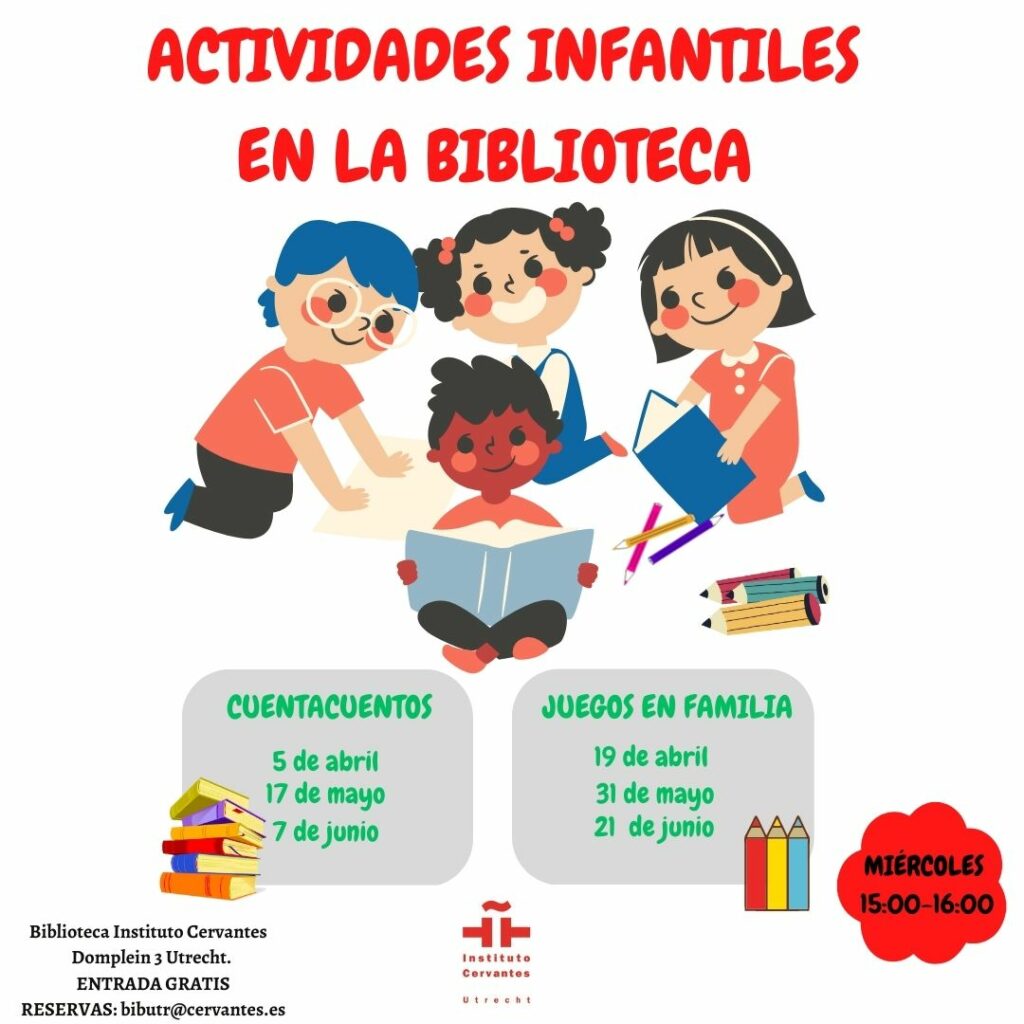
Día del libro
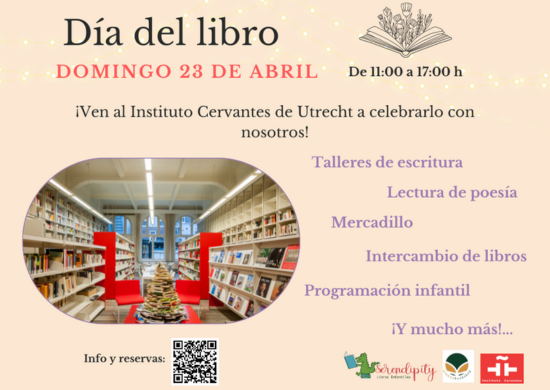
El Instituto Cervantes de Utrecht se suma un año más a la celebración del Día Internacional del Libro y el fomento de la lectura, con un amplio programa de actividades gratuitas para todos los públicos.
Nuestra biblioteca José Jiménez Lozano abrirá sus puertas durante toda la jornada y será el epicentro de actividades como el intercambio anónimo de libros Libros que importan, el mercadillo de libros usados y el acto de lectura poética pública, que clausurará el programa. Las librerías locales Stanza y Serendipity también estarán presentes con las últimas novedades de libros para niños y adultos en español.
Nuestro salón de actos concentrará la actividad infantil. Allí, los más pequeños podrán asistir a un cuentacuentos, a un divertido taller artístico y a diferentes juegos y propuestas lúdicas.
Los lectores con vocación de escritores también tendrán su espacio en la programación. El especialista en escritura creativa Jorge Gonzalvo visitará nuestro Centro para impartir sendos talleres: un primero, para adolescentes, titulado La asombrosa máquina de generar historias, y un segundo para adultos, denominado El personaje habitado (inscripción obligatoria con plazas limitadas).
Pero esto no es todo. También tendremos música en directo, con la cantante Isabel Bermejo, que interpretará grandes temas de los cantautores españoles e hispanoamericanos, y una divertida actividad de poesía susurrada. Además habrá un puesto de comida donde puedes comprar bocadillos, tentempiés y bebidas. ¿Te lo vas a perder?
Reservas 1er taller infantil ‘La fábrica de libros’: https://www.eventbrite.com/e/dia-del-libro-taller-infantil-tickets-600337996107
Reservas 2º taller infantil ‘La fábrica de libros’: https://www.eventbrite.com/e/dia-del-libro-2o-taller-infantil-la-fabrica-de-libros-tickets-604957854227
Reservas Cuentacuentos ‘Enigma animal’: https://www.eventbrite.com/e/dia-del-libro-cuentacuentos-enigma-animal-tickets-604966169097
Reservas taller de escritura para todas las edades: https://www.eventbrite.com/e/dia-del-libro-taller-de-escritura-para-adolescentes-10-a-17-anos-tickets-596878418417
Reservas taller de escritura para adultos: https://www.eventbrite.com/e/dia-del-libro-taller-de-escritura-para-adultos-18-anos-tickets-596926823197
Het Instituto Cervantes in Utrecht viert ook dit jaar weer Wereldboekendag om het lezen te stimuleren, met een uitgebreid programma van gratis activiteiten voor alle doelgroepen.
Onze José Jiménez Lozano-bibliotheek zal de hele dag open zijn en het epicentrum vormen van activiteiten zoals de anonieme boekenruilbeurs «Libros que Importan», de tweedehands boekenmarkt en de openbare poëzievoordracht die het programma afsluit. De boekhandels Stanza en Serendipity zullen ook aanwezig zijn met de nieuwste (kinder)boeken in het Spaans.
De kinderactiviteiten vinden plaats in ons auditorium. Daar wordt voor de kleintjes een verhaal voorgelezen en kunnen alle kinderen meedoen aan een leuke kunstworkshop en verschillende spelletjes.
Lezers met een roeping tot schrijven komen ook aan hun trekken in het programma. De specialist in creatief schrijven Jorge Gonzalvo zal ons centrum bezoeken om twee workshops te geven: de eerste, voor alle leeftijden, getiteld «La asombrosa máquina de generar historias», en de tweede voor volwassenen, getiteld «El personaje habitado» (inschrijving is verplicht, met beperkte plaatsen).
Maar dat is nog niet alles. We hebben ook live muziek, met de zangeres Isabel Bermejo, die geweldige liedjes zal brengen van Spaanse en Latijns-Amerikaanse singer-songwriters, en een leuke activiteit met gefluisterde poëzie. De gehele dag is er een stand waar je lekkere broodjes, snacks en drinken kunt kopen. Dit wil je toch niet missen?
Cuentacuentos de Pascua
El conejo de Pascua ha llegado al Instituto Cervantes para dejarnos unas entretenidas historias de aventuras y de amistad. Hablaremos sobre qué se celebra en la Pascua y por qué un conejo nos trae unos deliciosos huevos de chocolate. Después del cuento podrás buscar los huevitos en los rincones de la biblioteca y del Instituto. Conviértete en un verdadero detective: escucha, mira e investiga las pistas para encontrarlos y ven a disfrutar con tu familia y a compartir con otros niños y niñas. Si quieres puedes traer tu cesta para recoger los huevitos de chocolate.
¡Te esperamos en la biblioteca!
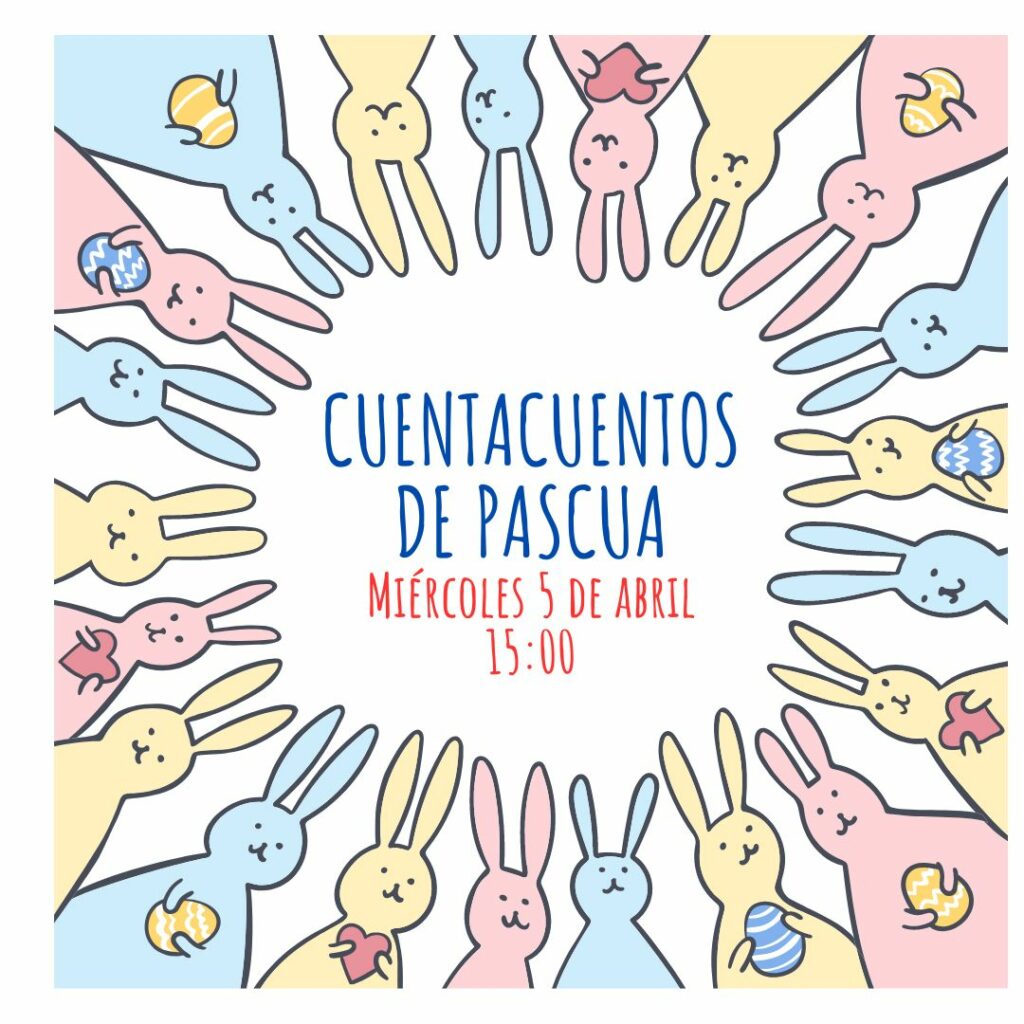
VERHALEN VOORLEZEN OP 5 APRIL
De Paashaas heeft bij het Instituto Cervantes leuke en vermakelijke verhalen vol avontuur en vriendschap gebracht. We lezen over het Paasfeest en wat we dan vieren én we komen te weten waarom de Paashaas zulke heerlijke chocolade paaseieren voor ons meeneemt. Na het voorlezen kun je paaseitjes zoeken in de bibliotheek en in het Instituut. Wordt een echte detective: luister, kijk, volg de aanwijzingen en vind de paaseitjes. Kom naar de bibliotheek om samen plezier te beleven, en vergeet niet jouw paasmandje mee te nemen om de chocolade eitjes in te verzamelen.
We zien uit naar je komst!